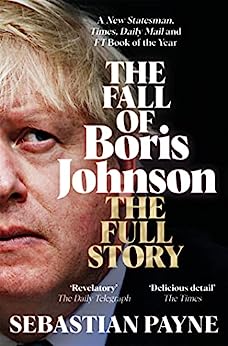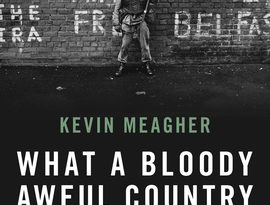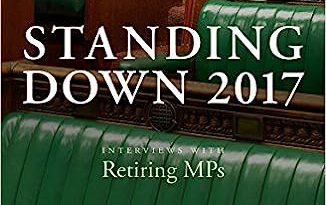BOOK REVIEW : The Fall of Boris Johnson – The Full Story by Sebastian Payne
Published in late 2022, shortly after the resignation of Boris Johnson was announced, the Financial Times columnist Sebastian Payne wrote this account of what was happening behind the scenes to have caused his sudden fall from grace. He starts the account in November 2021 with Johnson arriving for drinks at the Garrick Club at an reunion event for former Telegraph journalists. It was held at the height of Johnson’s powers and notable as it was suggested that discussions were had about how to save the career of Owen Paterson. Charles Moore has denied that he was involved with these discussions, but the book quotes a Cabinet Minister who said “the first rule of politics is that if you listen to Charles Moore and do the complete opposite of what he says, you won’t go far wrong”. Johnson, it is suggested, may have received bad advice on Paterson and was given false confidence on how strong his position was.
A substantial section of the book is given over to the controversial parties which were taking place in Downing Street, whilst the rest of the country was ordered to stay at home. Ultimately, this brought down the Prime Minister, but it was the confusion and false denials that was ultimately the problem rather than the parties themselves. But there was much naivety at the time, the book quotes one senior official at Number 10 who said staff were advised not to come out of the front door grinning, adding “I didn’t think anybody would need reminding not to have a massive piss-up in the garden”.
Whilst Sue Gray was writing her report into the Downing Street parties, supporters of Johnson realised the danger that he was in and started their campaign entitled “Operation Big Dog”. This included politicians such as Nigel Adams, Chris Heaton-Harris, Grant Shapps and two young advisors, Charlotte Owen and Ross Kempsell who have recently and controversially been elevated to the House of Lords for their efforts to support the beleaguered Johnson premiership. On 31 January 2022, the first interim report was issued by Gray which noted that the parties had been “difficult to justify” and that there had been “failures of leadership”. Although sounding damaging, Payne notes in the book that when Johnson received the report “the Prime Minister’s reaction was relatively positive according to those in the room as it wasn’t as hostile as it might have been”.
The book then moves into a chapter entitled “Putin’s Move”, which is when Russia launched their illegal invasion of Ukraine on 24 February 2022. The author notes the close relationship between the Ukrainian President Volodymyr Zelenskyy and Boris Johnson, with this political event looking like one where Johnson could restore some credibility and show leadership. This looked like the distraction that Johnson needed, with Payne noting that “over the following weeks, Johnson would garner some of the greatest praise of his premiership thanks to the confident response to the situation in Ukraine”. The events weren’t enough, as the author writes “his political standing in the UK would rapidly crash back down to earth when an email dropped in his personal inbox from the Met police, informing him of a penalty notice”.
Johnson faced a no confidence vote after 15% of Conservative MPs wrote letters to Graham Brady, the chair of the 1922 committee, but he was determined to fight. Instead of going to speak to MPs, he had a mail merge letter sent to 358 MPs and “spent hours topping and tailing letters by hand with a fountain pen”. The printer jammed, the process took hours and he “geared up for the battle of his political life”. The result announced that evening by Brady was that 211 MPs had confidence in Johnson, whilst 148 did not. It was a poor result, but it was sufficient for Johnson to believe he had another 12 months before he could be challenged again.
A few weeks later an incident with Chris Pincher brought Johnson’s credibility and judgement into question once again and on the same evening Sajid Javid and Rishi Sunak announced their resignations as Health Secretary and Chancellor. Attempts were made to begin an emergency reshuffle, but as the author notes “privately, near all of the [inner team] knew the end was almost nigh”. The book continues with a blow by blow account of how the wave of Ministerial resignations forced Johnson out, the end was indeed nigh.
The final chapter of the book is entitled “Was it always going to end this way?” and Payne asked this question of many Cabinet Ministers, senior civil servants and confidants of Johnson. Reflecting on the responses, Payne broadly says yes it was, noting “throughout the interviews, one consistent theme emerged, and that was that Johnson resists the idea that he has to bother with the consequences for his actions that normal people have to contend with”. It’s a well written and interesting book which is even handed, although there’s scepticism about the competence of Boris Johnson, but it’s a recommended read for those wanting to find out more about how he went from winning a General Election to be forced out under three years later.



